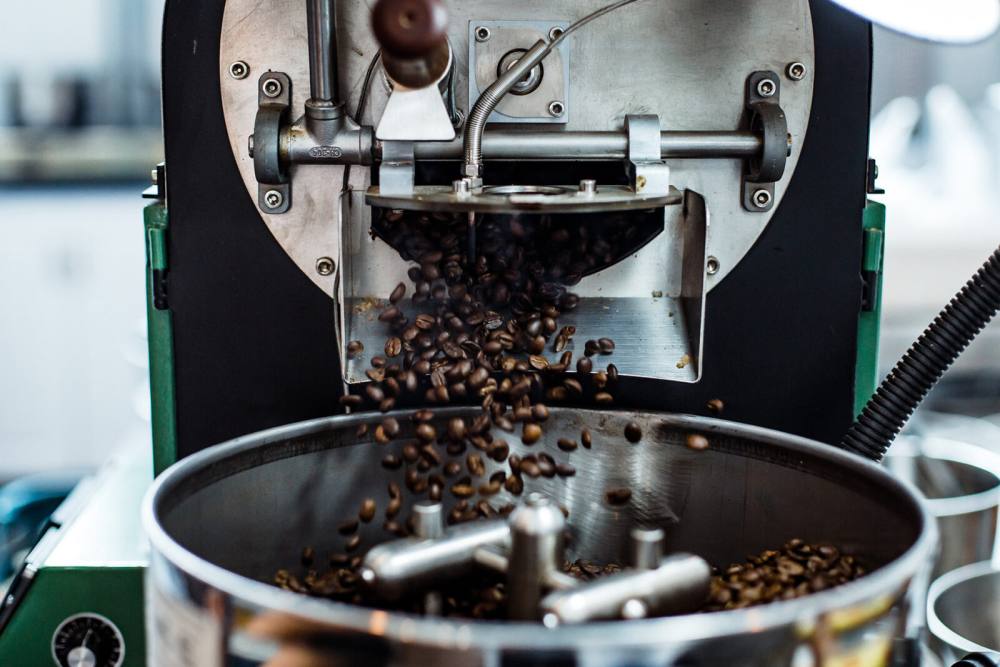A sample roaster is a small roaster, usually with a capacity of less than 300g, that is used to test roast samples of green coffee beans. These are then evaluated for quality, taste and aroma.
These small samples are often sent to roasters by a trader or producer, and can for understandable reasons be sent much more quickly than 60kg bags of green coffee. They are used by green coffee buyers to ascertain the quality of a much larger lot before they place an order.
A sample roaster is a vital part of any roasting business’ setup. Coffee roasters need to ensure they are delivering quality and consistency, and sample roasters help them guarantee it when buying green coffee.
But why is using a high-quality sample roaster so important? Read on to find out.

Choosing a sample roaster
There are a few different types of sample roasters, including drum roasters, digital roasters, and countertop home roasters. Each of them has unique capabilities in terms of automation, workflow, technology, and airflow.
Some roasting equipment manufacturers produce machines in multiple formats, or manufacture both production sized and sample sized roasters. For example, three of the most prominent manufacturers are Probat, ROEST, and Ikawa. All of these three brands build sample roasters, and each of them uses a different design.
Drum roasters are the classic choice. These machines roast coffee through airflow and conduction, which heats the drum and then the beans. Drum roasters are popular for both sample and production machines; for the former, they will generally have a capacity of between 30g and 300g. However, they are less precise than more modern alternatives when it comes to airflow control.
Digital sample roasters are a newer, more convenient option, mainly because they provide the user with more data points and the ability to set programmable roast profiles. This means that you can repeat the same roasting process on different sample roasters, or easily replicate the same profile with different lots of coffee.
Digital sample roasters are also generally a lot smaller, making them useful when space is at a premium. Unlike drum roasters, digital sample roasters produce heat mainly through convection. This is known as fluid bed or Sivetz roasting, and involves passing heated air through the beans to roast them.
The third category of sample roasters is home roasters, which are often designed for countertop use. These were initially designed for home coffee enthusiasts, as they are compact and affordable, but they are also suitable for sample roasting.
These are also popular with coffee producers, as well as buyers, because they generally have a very short turnaround time. At origin, this can allow producers to incorporate measures on-farm in real time.

Introducing Condesa’s brand new sample roasters
At Condesa Co.Lab, we introduced three new ROEST sample roasters in May 2021. These have been hand-built in Norway, and boast many qualities that improve workflow in our coffee lab.
They are electrically powered, making them quieter than other sample roasters, which creates a more comfortable lab environment.
These machines also combine the benefits of a drum and fluid bed roaster in one device. They allow the user to take full control of temperature, power, airflow, drum RPM (revolutions per minute), charge temperature, development time, crack rate, and more, making precise adjustments during the roast. In addition, the entire unit is light – clocking in at just 14kg – and is compatible with a range of existing smart tech.
These digital sample roasters also offer the option to fully automate your roast. In this case, the only manual step is dropping the dose, which enables staff to work on other lab tasks while the coffee is roasting.
The dose size for these ROEST sample roasters starts at 50g, with an upper range of 120g. The machine also has built-in first crack detection, using a microphone in the roaster itself.
Because ROEST sample roasters have Wi-Fi connectivity, all roast profiles can be saved in a library that can be easily exported to other units. Once you find the optimal roast profile, it can then be replicated without a hitch.
However, you don’t necessarily want to use the same roast profile for all your sample roasting. Remember that green coffee is a product with plenty of variety. This means that coffees from different regions and origins will require a different approach.

A sample roaster is a key part of any coffee roaster’s setup. It helps buyers choose green coffees in the first place, as well as supporting roasters with training and cupping further down the line.
Having a reliable, high-tech sample roaster can greatly improve your ability to get the best out of each coffee. It will allow your business to be ever more precise with their sample, and truly align the coffee you’re buying with what you know your customers want.
This is why we chose to work with ROEST’s fantastic sample roasters here at Condesa Co.Lab. We’re excited to use these machines, and we want to share this excitement with our partners and customers, because we know it’s going to mean one thing above all else: better coffee for everyone we work with.

